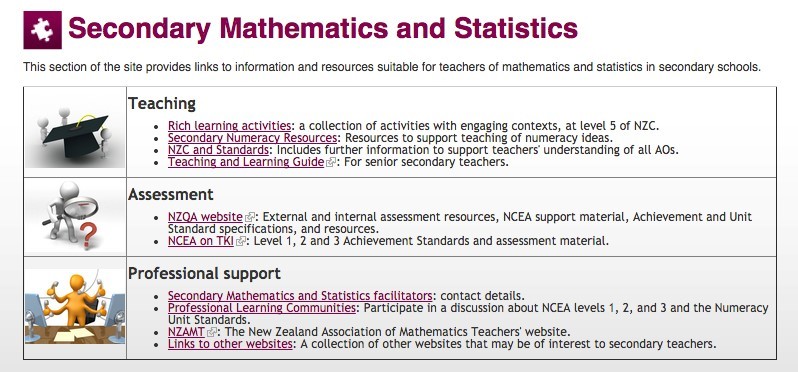The following are some Numeracy resources and websites to support acceleration through alignment and spread. This is not seen as an exhaustive list but rather something to help get you started.
Resources: Numeracy
“Maths turns up in all learning areas of course, but teachers generally hate numbers and are blind to this subject. The experience a lot of teachers have had learning mathematics in the past dominates attitudes to the subject now - the past teaches the future.
The tick/cross/right/wrong nonsense instead of sensible feed forward and learn from your mistakes attitude destroyed and destroys a lot of good learning and futures. Mathematics is the only subject where problem solving can be developed and practiced from simple beginnings. It is the only subject where a truth exists, hence proof.
I notice that Māori students like mathematics and try to do well in it. They value being good with numbers. Like all students their progress depends on the interaction or relationships they have with teachers. If they develop independence and experience success before they get disappointed they will become users of mathematics (and statistics)”.
- (Maths advisor, 2015).
Effective Pedagogy in Pāngarau/Mathematics
Mathematics is a powerful social entity. Arguably the most international of all curriculum subjects, mathematics plays a key role in shaping how individuals deal with the various spheres of private, social and civil life. The belief that mathematics is a key engine in the economy is widely shared by politicians and social planners, the corporate sector, parents, and the general public. Mathematical competencies and identities that make a valuable contribution to society are developed from specific beliefs and practices.
Today, just as in past decades, many students do not succeed with mathematics; they are disaffected and continually confront obstacles to engaging with the subject. The challenge for those with an interest in mathematics education is to understand what teachers might do to break this pattern. How teachers can enhance all students’ access to powerful mathematical ideas—irrespective of socio-economic background, home language, and out-of-school affiliations—is fundamental to this best evidence synthesis.
NCEA Mathematics
- Some more thoughts from the maths advisor to secondary schools...
“I suspect many learning areas just use the mathematics and statistics they happen to know about and ignore it otherwise. Geography is rich in maths but is generally out of sync with math learning and assessment in Level 1. Geography is seen as literacy but is a deep thinking generalist subject. Science has its methods and to them maths is a tool. Technology measures but does not get numeracy credits in NCEA L1 for doing it. There are math NCEA achievement standards which can be assessed in subject areas that include mathematical thinking e.g. Art Design uses reflection, rotation, and translation which is assessed under AS91034. Science uses AS90935 which is all about bivariate measure, a stats standard. (Maths advisor, 2015)
The advisor presented a Science and Maths combined Level 1 programme which draws on both Science and Maths Achievement standards throughout the year, eg:| Y11 Science Mathematics Programme 2014: Term 1 In this term, you study linear relationships, eg
Assessment opportunities:
Literacy priorities:
|



